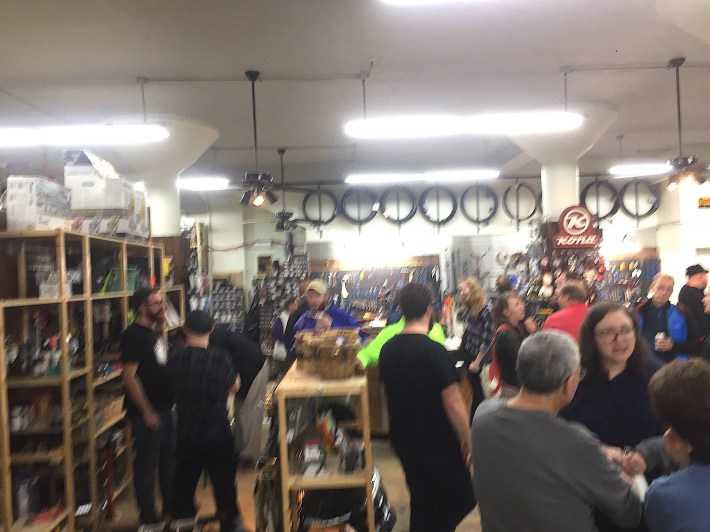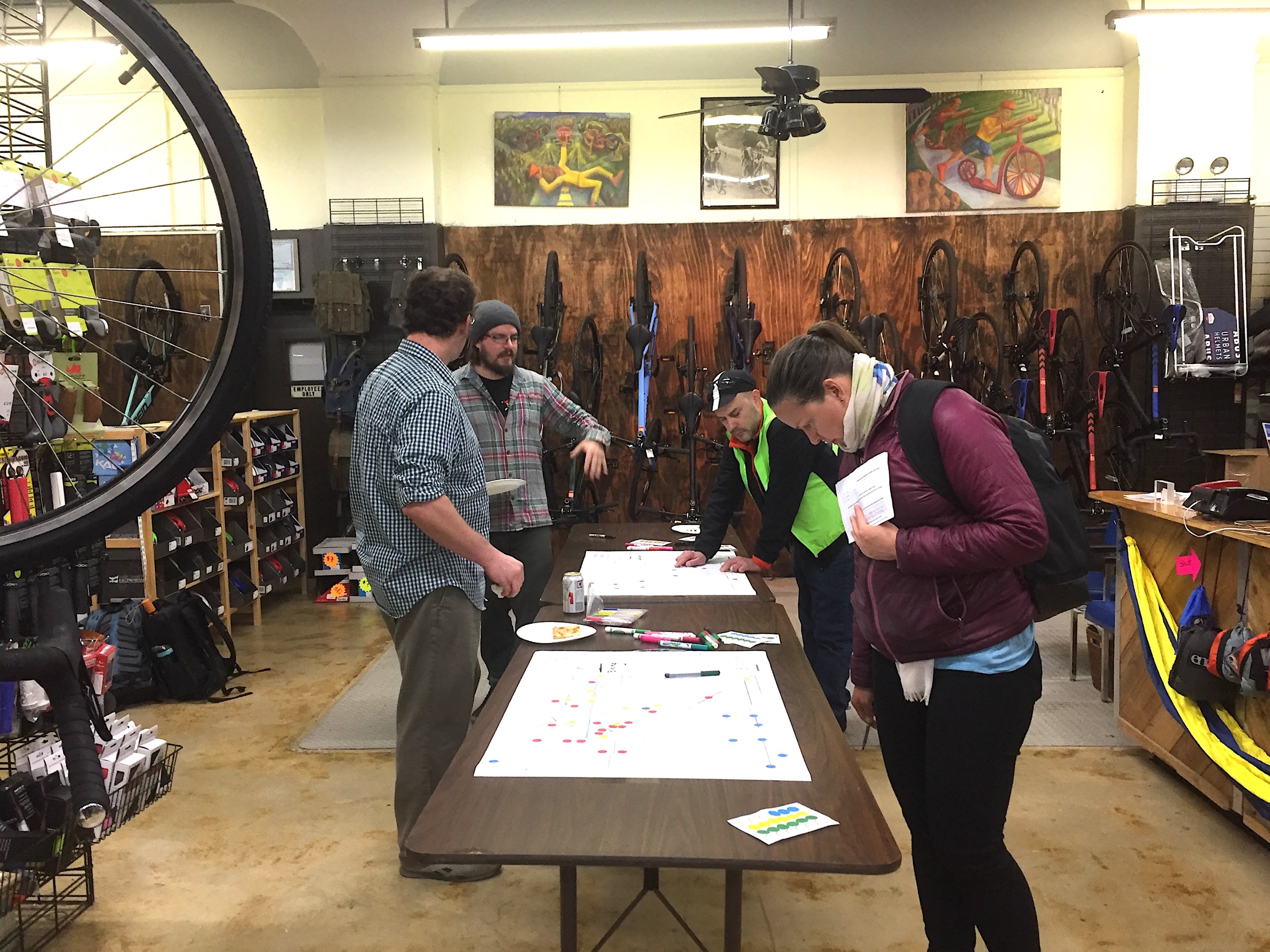
A small but hearty group of Northwest Side residents braved the cold and rain Tuesday night to meet with Active Transportation Alliance staff and other cycling advocates to discuss ideas to improve pedestrian, cycling, and transit conditions in some of Chicago’s outlying neighborhoods.
Hosted at Cosmic Bikes on Milwaukee Avenue in Jefferson Park and facilitated by Active Trans staff, the meeting was an open forum to gather ideas. Squeezed between displays of bikes and helmets, participants poured over maps, marking them extensively with concepts for new infrastructure and improvements.
In spite of this part of town's reputation for being car-dominated, the gathering revealed an engaged community of Far Northwest Side cyclists and sustainable transportation activists. Some of them include residents who were displaced by rising prices further southeast while others are long-time residents eager to walk and bike more on safer streets.
Lots of work still needs to be done to improve conditions in this part of Chicago. Jason Sislow, a Northwest Side representative on the Mayor’s Bicycle Advisory Council explained that he was surprised how challenging biking on the Northwest Side can be after he moved here three years ago.
“I was shocked by the difference in cycling infrastructure once you crossed the [Kennedy] Expressway…The attitude of drivers with having cyclists around, the lack of infrastructure like lanes, and problems just trying to cross the expressway” all make cycling more difficult in Northwest Side neighborhoods, he said.
According to Sislow, building out a connected bikeway network is the first step needed to get more Northwest Siders on bikes: “There are a lot of lanes that just don’t go anywhere,” he said, adding that too often you’ll get on a bike lane or bike trail and be dropped unceremoniously when the bikeway ends.
This is ironic, because their has been a significant expansion of paved trails through Far Northwest Side parks and forests preserves in recent years. Although these are welcome, they are of limited use as transportation corridors because they are not always connected to each other or the bikeway network. Sislow noted that if decision-makers fail to improve these connections, that could hinder future investments in bike and pedestrian infrastructure.

“Until we have an actual network, people won’t use [the bikeways] and we just end up with these parts that we spend money on that people then get upset about when they don’t see people using [them]. I appreciate that the city does it, but I think it’s counter-productive to the cause of good cycling if we just have small sections of lanes that don’t go anywhere or connect anything,” Sislow explained.
It's also important for bike advocates to think about how to engage a new demographic of residents and potential riders. A contingent of Far Northwest Side residents have been vehemently opposed to many proposed changes to the area, such as road diets for protected bike lanes, and the construction of dense housing near the Jefferson Park Transit Center.
According to Sislow and Cosmic Bikes owner Justyna Frank, talking about cycling on the Northwest means changing the conversation to fit with a different set of community values. For one thing, it's important to dispel the notion that cyclists are just a bunch of hipsters from other parts of the city.
“Tons of working people bike,” Frank said. “There was one woman here you would not peg as a cyclist, because she does not affiliate with a cycling community. She is an old-time Chicagoan. She’s a working-class lady.”
Indeed, the average person riding a bike on Far Northwest Side cyclists may not fit the same demographic as a typical Logan Square cyclist. So to increase cycling by other residents in this part of town, it's necessary to communicate the value of cycling in a new way. One starting point is better articulating how reducing the number of drivers on the road will benefit those who do drive.
“First, for those families that depend on cars, every other car that comes off the street is making their commute easier,” Sislow said. “Second, every ward in the city…spends half their discretionary budget on their streets and yet they can’t keep up. So every vehicle they can convert to another method of transit is less congestion, [less damage to roads], and better services for everybody.”
Opening a conversation about cycling on the Northwest Side may prove vital for improving both the physical infrastructure available to residents, but also creating a more robust and diverse community of cyclists in Chicago. This is vital for growing the political capital of the cycling community.
This post is made possible by a grant from Freeman Kevenides, a Chicago, Illinois personal injury law firm representing and advocating for bicyclists, pedestrians and vulnerable road users. The content belongs to Streetsblog Chicago, and Freeman Kevenides Law Firm neither endorses nor exercises editorial control over the content.




